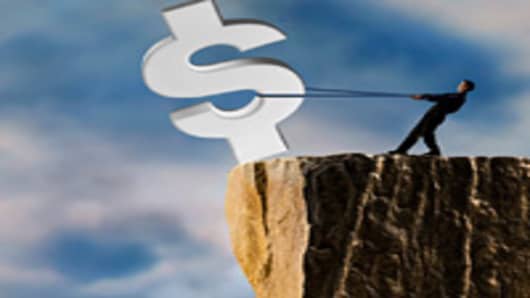If the atmosphere this week in Chicago was any indication, professional investors remain largely in denial that the looming fiscal disaster in Washington will come to very much.
True, the words "fiscal cliff" were never far from most lips among the throng of 4,000 at the Charles Schwab Impact 2012 conference.
But for the most part, the tones were dismissive, cognizant of a worst-case scenario, but relatively secure in the belief that it will not come to fruition.
"I'm concerned, but I'm confident both sides realize that we're going to have a compromise," said Joseph M. Moran, senior vice president and head of wealth management for Oppenheimer Funds. "The last thing either side wants on their plate is to be responsible for another recession."
And another recession is almost a certainty if Washington chooses to continue to play politics and go over the cliff. (Read More: What Traders Hope For—and Fear— in DC 'Fiscal Cliff' Talks)
The risks involve $600 billion worth of spending cuts and tax increases that will take effect unless warring Democrats and Republicans agree to deficit-reduction targets.
The cliff is less a black swan than a hovering falcon, a bird of prey that will not sneak up on the market as was the case with the 2008 financial crisis, but rather has been in plain view for months.
Stock market prices fall an average of 30 percent during recessions and most of the market chatter has attributed the recent slide to cliff fears.
But you wouldn't feel much of the danger by talking to attendees at the Schwab conference.
"At the moment there's just so much opportunity because there's so much negativism out there in every shape and form," said William Smead, portfolio manager for the Smead Value Fund, a Morningstar five-star-rated fund.
Quick to quote Warren Buffett, Smead is emphatic that investors who stick to their knitting, look to the long term and avoid falling into emotional traps posed by issues such as the cliff are the ones who prevail over time. (Read More: Warren Buffett Wants to Make the World More 'Fun')
"When everyone shares the same psychology, the marginal profitability for whatever that psychology is is very low and allows people with the opposite side of that psycholgy to do very well," he said.
Smead's fund is historically spread among 25 or 30 of what its managers feel are the best of the best. The top current top holdings are eBay, Cabelas, and Gannett — a seemingly disparate group that nonetheless share qualities such as competitive edges and lots of free cash flow.
He makes it sound easy, but it's not.
The mood at the conference was one clearly of trepidation even if the concerns spread beyond the cliff ramifications and into the troubles in Europe and a generally slowing global economy.
Conversations with dozens of investment pros revealed a feeling that the market was changing, that just following the U.S. Federal Reserve and its band of merry money-printers might not be enough anymore.
That mood was exacerbated by the notable presence of some market heavyweights at a conference that often attracts mostly plain-vanilla fund managers bandying about the "stocks are cheap" mantra to anyone who will listen.
The signs of an evolving marketplace were unmistakeable.
Here was Mario Gabelli enthusiastically greeting passers-by. There was private-equity legend George Roberts, of KKR, manning a booth and touting an unlikely fund alliance with Charles Schwab. (Read More: Great Time for 'Grave Dancers': KKR, Schwab)
And, of course, there was the tag-team of Erskine Bowles and Alan Simpson, authors of the now-famous deficit-reduction manifesto, spending an hour on CNBC and another hour on the mainstage, urging — practically pleading with — investors not to take the cliff lightly. (Read More: Obamacare Will Have to Be Slashed: Simpson-Bowles)
"You have to be honest with people, because Erskine and I don't do B.S. or mush," Simpson said.
But in spite of the Simpson-Bowles admonitions, many managers remain convinced at least a temporary solution will come to pass, and are planning their investment choices accordingly.
"We're looking for growth in the 2 percent range next year, assuming we get some resolution on the fiscal cliff," said Michelle Stevens, managing director and senior portfolio manager at Robert W. Baird. "We see fiscal spending cuts as a downside risk, close to a recession domestically. We're not assuming that now because we're hopeful that Washington can get it back together."
But what if it doesnt? What if the cliff deadline comes and goes with no resolution, and a market that already has lost more than 5 percent of its value since President Barack Obama was re-elected has to face the prospect of an even worse economy ahead?
Greg Valliere, chief political strategist at Potomac Research Group, tried to assure the convention-goers that the most likely scenario was some kind of compromise, but even he didn't seem quite so sure.
"I think that will be enough to get them home for the holidays," he said of Congress. Later, however, he added that the solution won't be long-term. "We could be looking at several more months without a resolution on this issue, and that is not a great story."



